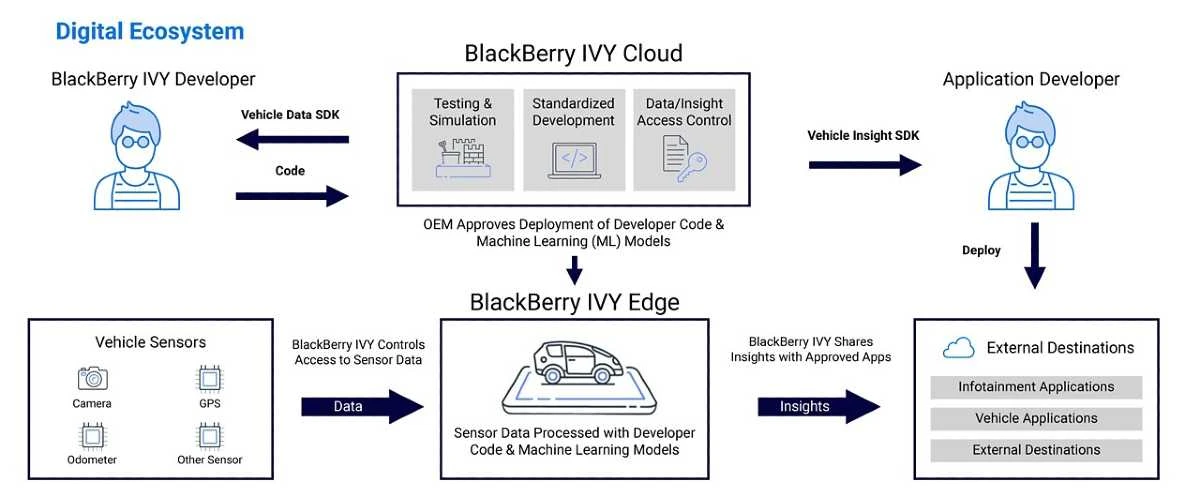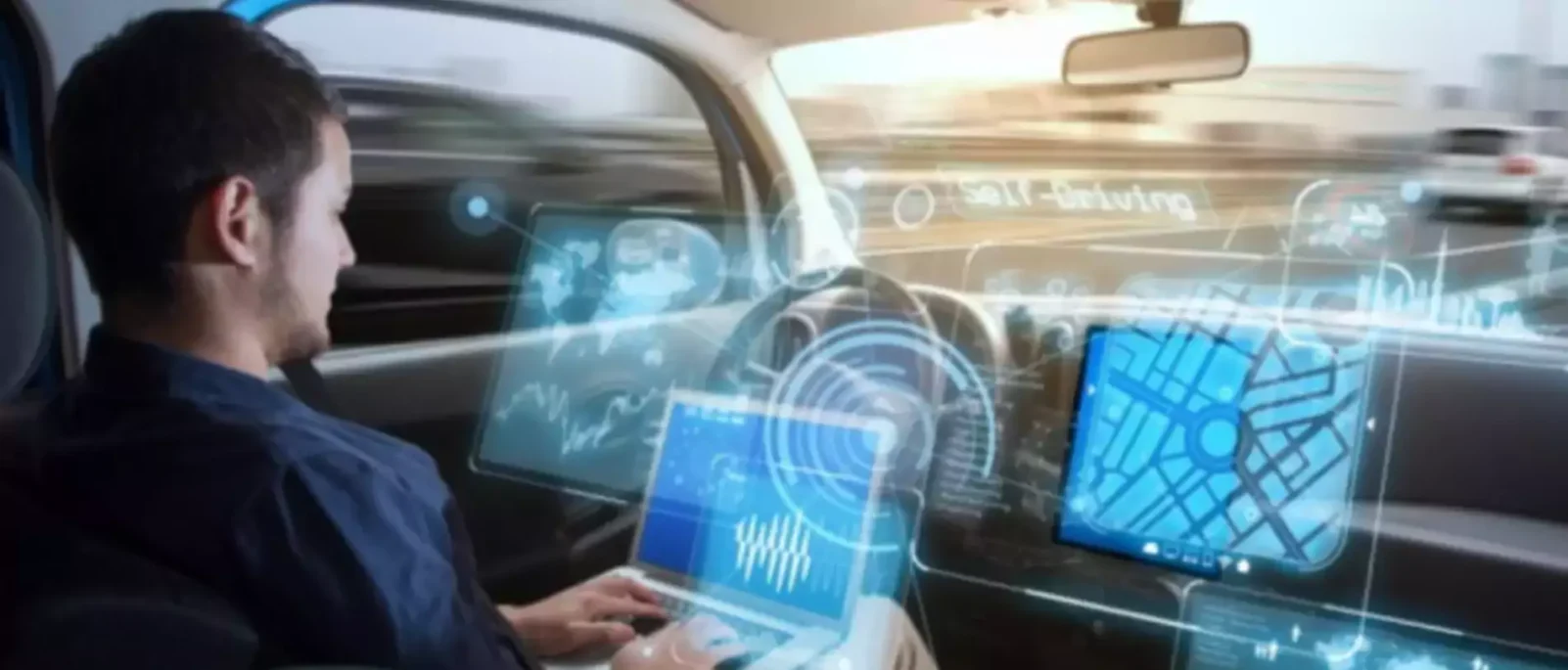BlackBerry today demonstrated an automotive-grade hardware demonstration of BlackBerry IVY, the company’s Intelligent Vehicle Data Platform, co-developed with Amazon Web Services (AWS).
This demonstration is available to view at CES 2022 in Booth #4319 in the West Hall, marking the first time BlackBerry IVY has been publicly shown on physical hardware.
The EV Range Expert demo showcases how BlackBerry IVY is leveraged to develop enhanced experiences for a family embarking on a road trip in their electric vehicle.
At the booth, visitors can see in real-time the AI-based decisions being made by BlackBerry IVY and what the in-car experience could look like for drivers and passengers though a physical car dashboard. Incorporating technology from BlackBerry IVY ecosystem partners including HERE Technologies, Car IQ and Electra Vehicles, the demo illustrates powerful use cases that can be enabled via the platform in the form of enhanced predictions, intelligent recommendations and in-car payment capabilities that utilize in-vehicle data from multiple sensors.
Leveraging Electra’s EVE-Ai™ 360 Adaptive Controls for battery pack optimization, the demo provides an accurate battery state of charge (SoC) and range prediction based on driver detection and personalization, while actively working to extend range and preserve battery lifetime.
Additionally, the demo ingests preloaded HERE Technologies’ data to provide tailored guidance, pricing and availability of vehicle charge stop locations, more efficient routes with carbon footprint estimates, and individual driver customizations.
A third integration via Car IQ creates a “digital fingerprint” for the vehicle, allowing it to securely connect to a bank, card payment networks and in-vehicle marketplaces that allow the car to validate and autonomously pay for a wide range of frequently used services, including EV charging, tolls, parking, insurance, maintenance, and other payment and wallet capabilities.
The multi-OS, distributed architecture demonstration features BlackBerry IVY running on both Linux and QNX across gateway and digital instrument cluster domains, in collaboration with KPIT Technologies.
“There’s no better place than CES to showcase what the future of mobility will look like and it’s a real thrill to finally lift the curtain on BlackBerry IVY and show to the world the vast potential that it can unlock for OEMs, Tier 1s and end users alike,” said Vito Giallorenzo, SVP Corporate Development & Chief Operating Officer, IoT.
“BlackBerry IVY allows automakers to develop a better understanding of how vehicles are used and can be improved while allowing software developers to create enhanced services and experiences for drivers.
Being able to see in real-time how the platform enables all this is incredibly powerful and a great a catalyst to help those from across the transportation industry re-imagine all that is possible when you have the right tool, and I’m sure there will be no shortage of these ‘light bulb’ moments when visitors see it for themselves.”
BlackBerry’s full suite of automotive offerings will be demonstrated at the Consumer Electronics Show (CES) in Las Vegas from January 5 – 8, 2022, at the Las Vegas Convention Center. Visit BlackBerry at Booth #4319 in the West Hall.

Announced in December 2020 as part of a multi-year, global agreement with Amazon Web Services (AWS), BlackBerry IVY is a scalable, cloud-connected software platform that will allow automakers to provide a consistent and secure way to read vehicle sensor data, normalize it, and create actionable insights from that data both locally in the vehicle and in the cloud. Automakers can use this information to create responsive in-vehicle services that enhance driver and passenger experiences.
BlackBerry IVY addresses a critical data access, collection, and management problem in the automotive industry. Modern cars and trucks are built with thousands of parts from many different suppliers, with each vehicle model comprising a unique set of proprietary hardware and software components.
These components, which include an increasing variety of vehicle sensors, produce data in unique and specialized formats. The highly specific skills required to interact with this data, as well as the challenges of accessing it from within contained vehicle subsystems, limit developers’ abilities to innovate quickly and bring new solutions to market.
BlackBerry IVY will solve for these challenges by applying machine learning to that data to generate predictive insights and inferences, making it possible for automakers to offer in-vehicle experiences that are highly personalized and able to take action based on those insights.
BlackBerry IVY will support multiple vehicle operating systems and multi-cloud deployments in order to ensure compatibility across vehicle models and brands. It will build upon BlackBerry QNX’s capabilities for surfacing and normalizing data from automobiles and AWS’s broad portfolio of services, including capabilities for IoT and machine learning.
BlackBerry IVY will run inside a vehicle’s embedded systems, but will be managed and configured remotely from the cloud. As a result, automakers will gain greater visibility into vehicle data, control over who can access it, and edge computing capabilities to optimize how quickly and efficiently the data is processed.
With BlackBerry IVY’s integrated capabilities, automakers will be able to deliver new features, functionality, and performance to customers over the lifetime of their cloud-connected vehicles, as well as unlock new revenue streams and business models built on vehicle data.
For instance, BlackBerry IVY could leverage vehicle data to recognize driver behavior and hazardous conditions such as icy roads or heavy traffic and then recommend that a driver enable relevant vehicle safety features such as traction control, lane-keeping assist, or adaptive cruise control.
IVY could then provide automakers with feedback on how and when those safety features are used, allowing them to make targeted investments to improve vehicle performance.
Additionally, drivers of electric vehicles could choose to share their car’s battery information with third-party charging networks to proactively reserve a charging connector and tailor charging time according to the driver’s current location and travel plans.
BlackBerry IVY could also provide insights to parents of teenage drivers who may choose to receive customized notifications based on insights from vehicle sensors when the number of passengers in the vehicle changes, when the driver appears to be texting, distracted, or not observing speed limits, or when the vehicle occupancy level rises above the parents’ desired safety threshold.
Similarly, parents of infants could receive a reminder to engage the child safety lock when the vehicle detects a child in the rear seat.
BlackBerry IVY will enable automakers to compress the timeline to build, deploy, and monetize new in-vehicle applications and connected services across multiple vehicle brands and models.
Instead of investing in one-off solutions that conform to the unique engineering of different vehicle models (as they do today), automakers using BlackBerry IVY will be able to leverage different types of data as common building blocks for new services that could work across a range of models.
Automakers will be able to use the platform’s application programming interfaces (APIs) to share data and outputs with their software development teams, giving them the ability to innovate, while also protecting customer privacy and security by controlling whom can access vehicle and app data and at what level of detail.
In addition, BlackBerry IVY will make it easier for automakers to collaborate with a wider pool of developers to accelerate creation of new offerings that deliver improved vehicle performance, reduced costs for maintenance and repairs, and added convenience.
For instance, by analyzing real-time performance data, automakers could recognize the first signs of potentially faulty parts, deploy code to identify affected vehicles, notify impacted drivers, and perform targeted recalls.
Automakers will be able to remotely deploy and update the software from the platform’s Cloud Console (a web interface for managing BlackBerry IVY) to continuously improve the functionality of the system.



